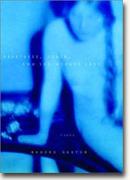Nakedness, Death, & the Number Zero: Poems
Brooks Haxton
book reviews:
· general fiction
· chick lit/romance
· sci-fi/fantasy
· graphic novels
· nonfiction
· audio books
· author interviews
· children's books @
curledupkids.com
· DVD reviews @
curledupdvd.com
newsletter
win books
buy online
links
home
for authors
& publishers
for reviewers

 |
Nakedness, Death, & the Number Zero: Poems Brooks Haxton Knopf Hardcover 81 pages October 2001 |
|
The poet's job, however, is never just to echo lost civilizations or show his erudition but, in Shakepeare's phrase, "to give to airy nothingness/A local habitation and a name." Haxton's work fulfills that requirement. Much of it is intensely local, personal, even intimate. He describes his first sexual encounter, the delivery of his twin daughters (which, I suppose to the disgust of all women, he compares with his own experience of tooth extraction), and scenes of his Mississippi childhood with clear precision and telling emotional impact. Like his fellow Southerner James Dickey, Haxton's best poems are narrative, using all the apparatus of a good short story. "Teenage Icon," for example, one of the longest in this collection, tells about the narrator's best friend in adolescence, with whom he fished, drank, and generally hung out. The scenes are described in almost eidetic detail: After the rain quit, overflowingLater, he tells of an ugly, dangerous incident that changed them forever. And then suddenly the story jumps to the present, then back again to a midpoint in time: He'd be fifty, if he's still alive.Most of the verse shows just that kind of restrained, careful craftsmanship. But this poet is a Boomer, after all, part of the generation both ennobled and spoiled by Holden Caulfield. The trouble with Holden was that he thought he had invented human sensitivity, and that no one else had it. Some of these poems, unfortunately, occasionally partake of that kind of emotional arrogance, straying away from their usual reportorial conciseness and veering close to sentimentality: that first time we made love, nighthawksThe title poem – maybe the least satisfying of all in this volume – errs in the opposite direction, toward a flat, prosy didacticism. It explains Archimedes' major scientific accomplishment (Archimedes' Principle, of course) and recounts the most famous anecdote about him, that the discovery excited him so much that he ran naked into the street to proclaim it. Then, not clearly connected to the first part, the poem reviews the history of the mathematical concept of zero. It is all mildly interesting, not new to most readers, I suspect, and in spite of elegant hexameters never shows the fine ear for rhythm that the poet usually displays. Here is the ending of this dreary poem: Soon after the Enlightenment, among Romantics, zeroMaybe this poem only demonstrates how limited are the possibilities of poems about mathematics. Never mind; a poet should be judged by his hits, not his misses. It's a pleasure to find a poet who knows poetry and seems to understand how it works. In his homage to Milton, "Memorizing 'Lycidas' Under the Warhol at the Walker," the long lines roll with something of Milton's own ponderous music, though the form is closer to Beowulf in its long lines See how the prosodies merge without any jarring: Though no one I had met believed it genuine, it gave me goosebumps.Yet in another poem he can move from Milton's gravity to assume a conversational, contemporary tone reminiscent of William Carlos Williams, as in "In Rhetoric, Adynaton Declares the Matter Inexpressible": . . . Look! If I could tell youPerhaps Haxton's best poem in this book is "On Re-Reading Hillman in the Light of Heraclitus." In this marvelously descriptive poem the poet's ear remains steady and his vision projects as clear and as baffling as an etching by M. C. Escher. A sample should make you want to read it all: . . . Of their own weight pages loosen, falling to my lap and to the floor. Snowflakes at the lower margins of the panes drift, in the night beyond, a few blurred spots of light. The calm inside the quiet falls away. In sleep, my twin girls, both of them at once, shift poses, . . . © 2002 by Conrad Geller for Curled Up With a Good Book |
|
|
|
 Click here to learn more about this month's sponsor! |
|
| fiction · sf/f · comic books · nonfiction · audio newsletter · free book contest · buy books online review index · links · · authors & publishers reviewers |
|
| site by ELBO Computing Resources, Inc. | |
 Haxton, a translator of Greek literature, comes honestly by the casual, familiar references to Archimedes, Orpheus, and Heraclitus that are sprinkled through his work. Beyond that, his ease with the classics allows him to draw authoritative pictures of a frighteningly chaotic Hades and an ancient scribe's ordinary working environment.
Haxton, a translator of Greek literature, comes honestly by the casual, familiar references to Archimedes, Orpheus, and Heraclitus that are sprinkled through his work. Beyond that, his ease with the classics allows him to draw authoritative pictures of a frighteningly chaotic Hades and an ancient scribe's ordinary working environment.